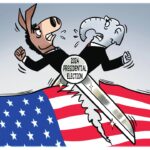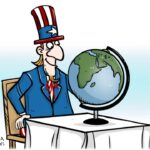Many people may have noticed that Lai and Hsiao Bi-khim recently have appeared more restrained and low-key, particularly in their statements on cross-Straits policies. Does this indicate a transformation for Lai, who once identified himself as a “pragmatic advocate for Taiwan independence”? Certainly not.
This is primarily because Lai won the elections with a “double minority.” This reflects that the DPP does not represent the mainstream public opinion on the island, and 60 percent of Taiwan’s population does not endorse the DPP. The majority of people in Taiwan who wish to remove the DPP from power constitute an overwhelming majority. However, due to design of Taiwan’s electoral system and the failure of the “blue-white coalition,” the DPP has gained an advantage. Lai is well aware of this situation, so he tactically restrained and disguised himself, not daring to directly oppose the mainstream public opinion on the island.
Furthermore, the US does not want to see Lai become the “second troublemaker” after Chen Shui-bian, disrupting the strategic rhythm for the US. Hence, after the elections, the US has explicitly conveyed signals not supporting “Taiwan independence.” Lai, who always pays attention to Washington’s attitude, cannot afford to be careless and must be cautious in his actions. This also once again demonstrates that “Taiwan independence” can never be achieved, neither in the past nor in the future. Anyone who violates the one-China principle internationally is interfering in China’s internal affairs and infringing upon China’s sovereignty, and will inevitably face the united opposition of the Chinese people and even the international community. Even the US is well aware of this.
Lai’s team must carefully read and understand the response of the spokesperson for the State Council Taiwan Affairs Office on the results of the Taiwan regional elections on the evening of January 13. Taiwan is China’s Taiwan. The elections will not change the basic landscape and development trend of cross-Straits relations, will not alter the shared aspiration of compatriots across the Taiwan Straits to forge closer ties, and will not impede the inevitable trend of China’s reunification. In other words, anyone who goes against this trend will be crushed.
In the response, the spokesperson particularly emphasized the “1992 Consensus” and stated that the mainland will work with relevant political parties, groups and people from various sectors in Taiwan to boost cross-Straits exchanges and cooperation, enhance cross-Straits integrated development, jointly promote Chinese culture, and advance the peaceful development of cross-Straits relations as well as the cause of national reunification, while firmly opposing the separatist activities aimed at “Taiwan independence” as well as foreign interference. In just a few sentences, it carries deep meaning, showcasing a strong stance against “Taiwan independence” forces and appealing to a broader population on the island for cross-Straits integrated and peaceful development. The message is clear and unambiguous, leaving no room for confusion or ambiguity.
Lai’s team has less than four months before taking office, at which time Taiwan will enter another four-year political cycle. During this period, we advise Lai’s team to fully understand the reality and overall situation in the Taiwan Straits, completely abandon the “Taiwan independence” path, and not try to package or disguise it. Such tactics are meaningless. Otherwise, in the next four years, the situation in the Taiwan Straits will be difficult to stabilize, and Lai’s team will be leading Taiwan into a precarious and unpredictable future. There is a clear criterion to assess whether Lai genuinely seeks peace: whether he accepts the “1992 Consensus.” Acceptance of the “1992 Consensus” is a prerequisite, and any explanation for non-acceptance is merely an excuse and a self-exposure of “Taiwan independence.”




